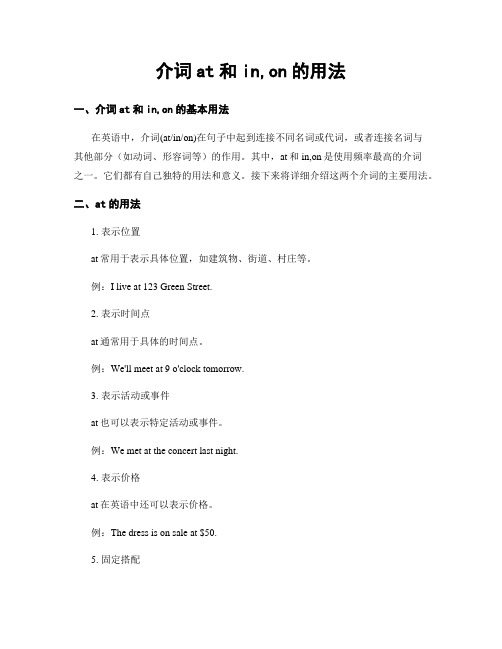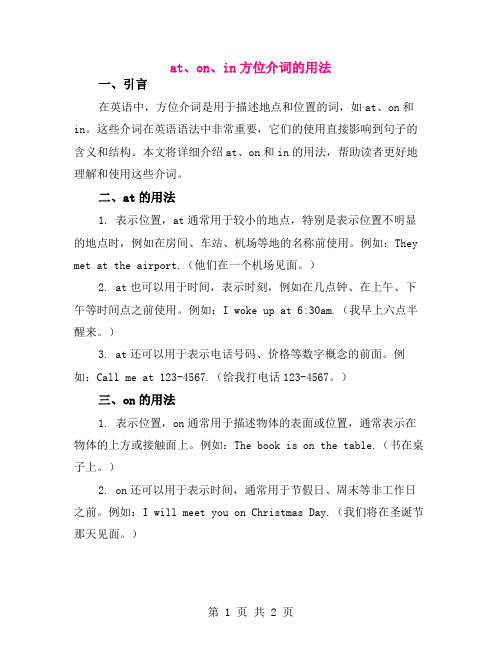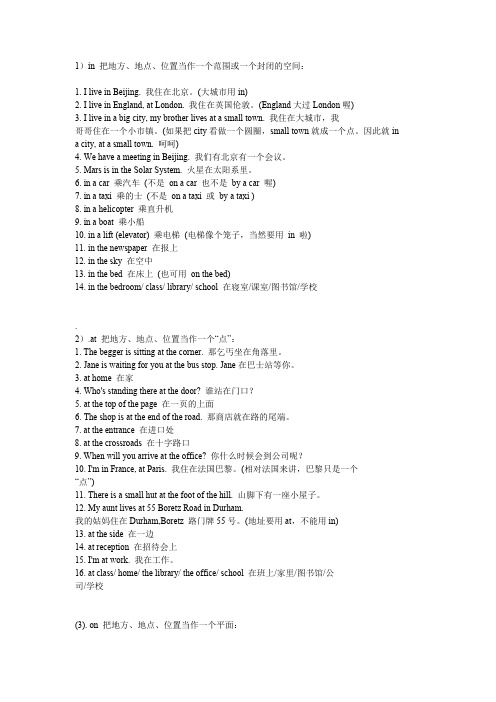英语介词 at in on 的用法
in和on和at的用法

in和on和at的用法In、On和At的用法In、on和at是英语中常用的介词,它们在不同的场合有不同的用法。
正确使用这些介词可以使我们的表达更加准确、清晰。
本文将详细介绍in、on和at的用法。
一、in的用法1. 表示位置(1)表示在某个范围之内:例:She is in the room.(她在房间里。
)(2)表示在某个地方或场所:例:I am in the park.(我在公园里。
)2. 表示时间(1)表示季节、月份、年份等长时间段:例:I was born in 1990.(我出生于1990年。
)(2)表示一天中的具体时间段:例:I always have breakfast in the morning.(我总是在早上吃早餐。
)3. 表示状态或情况(1)表示身体或精神状态:例:She is in good health.(她身体很健康。
)(2)表示情感状态:例:He is in love with her.(他爱上了她。
)二、on的用法1. 表示位置(1)表示在物体表面或靠近物体表面:例:The book is on the table. (书放在桌子上。
)(2)表示交通工具上:例:I am on the bus.(我在公交车上。
)2. 表示时间(1)表示具体的某一天:例:I will see him on Monday.(我会在星期一见他。
)(2)表示特定的节日或纪念日:例:We celebrate Christmas on December 25th.(我们在12月25日庆祝圣诞节。
)3. 表示状态或情况(1)表示进行中的活动:例:He is on the phone now.(他正在打电话。
)(2)表示某种运动或比赛:例:She is on the basketball team.(她是篮球队员。
)三、at的用法1. 表示位置(1)表示具体的地点或建筑物:例:We met at the station. (我们在车站见面了。
介词at,in,on的用法

介词at,in,on的用法一、介词at的用法在英语中,介词at是一个常见且十分重要的介词。
它可以用来表达时间、地点和状态等概念。
下面将具体介绍at在不同情况下的用法。
1. 表示具体时间首先,at可用来表示一个确切的时间点。
例如,我们说“at 8 o'clock”表示在八点这个具体时刻;“at noon”表示在中午;“at midnight”表示在午夜等等。
2. 表示特定地点除了表示时间,at还可用于表达特定的地点。
比如,“at the park”意为在公园;“at the cinema”意为在电影院;“at home”意为在家等等。
3. 表示某种状态此外,at还可以表示某种状态。
例如,“be at ease”表示感到安心;“be at war”表示处于战争状态;“be at a loss”表示感到困惑等等。
二、介词in的用法接下来,我们来讲解介词in的用法。
in常被用来表达位置、时间范围以及某些状态。
1. 表示位置首先,in可表示一般位置或方位。
比如,“in the living room”意为在客厅里;“in the garden”意为在花园中;“in front of the house”意为在房子前面等等。
2. 表示时间范围另外,in还可用于表示时间范围。
例如,“in the morning”意为在早上;“in July”意为在七月份;“in the 20th century”意为在20世纪等等。
3. 表示状态除此之外,in还可表示某种状态。
比如,“result in”表示导致某种结果;“succeed in”表示成功;“engage in”表示从事某种活动等等。
三、介词on的用法最后,我们来探讨一下介词on的用法。
on主要用于表示具体日期、星期几、表面和运输工具等方面。
1. 表示日期和星期首先,on常用来表示具体的日期或星期几。
例如,“on January 1st”意为在一月一日;“on Monday”意为在星期一等等。
介词at和in,on的用法

介词at和in,on的用法一、介词at和in,on的基本用法在英语中,介词(at/in/on)在句子中起到连接不同名词或代词,或者连接名词与其他部分(如动词、形容词等)的作用。
其中,at和in,on是使用频率最高的介词之一。
它们都有自己独特的用法和意义。
接下来将详细介绍这两个介词的主要用法。
二、at的用法1. 表示位置at常用于表示具体位置,如建筑物、街道、村庄等。
例:I live at 123 Green Street.2. 表示时间点at通常用于具体的时间点。
例:We'll meet at 9 o'clock tomorrow.3. 表示活动或事件at也可以表示特定活动或事件。
例:We met at the concert last night.4. 表示价格at在英语中还可以表示价格。
例:The dress is on sale at $50.5. 固定搭配at还与一些动宾结构固定搭配使用,如look at, laugh at等。
例:Don't laugh at others' mistakes.三、in的用法1. 表示位置范围in通常用于表示较大范围的位置,比如国家、城市等。
例:She lives in China.2. 表示月份/年份/季节等时间段in常用于具体的月份、年份、季节等时间段。
例:We'll go on vacation in July.3. 表示多久时间之内in也可以表示在一段时间内。
例:I can finish my work in two hours.4. 表示房间或建筑内部位置in还可以指室内的位置。
例:Please wait for me in the lobby.5. 与某些词固定搭配使用in和某些词组合使用时,有固定的搭配方式,如interested in, believe in等。
例:I'm interested in learning English.四、on的用法1. 表示接触面/表面位置on常用于描述平面接触面或表面位置。
at、on、in方位介词的用法

at、on、in方位介词的用法一、引言在英语中,方位介词是用于描述地点和位置的词,如at、on和in。
这些介词在英语语法中非常重要,它们的使用直接影响到句子的含义和结构。
本文将详细介绍at、on和in的用法,帮助读者更好地理解和使用这些介词。
二、at的用法1. 表示位置,at通常用于较小的地点,特别是表示位置不明显的地点时,例如在房间、车站、机场等地的名称前使用。
例如:They met at the airport.(他们在一个机场见面。
)2. at也可以用于时间,表示时刻,例如在几点钟、在上午、下午等时间点之前使用。
例如:I woke up at 6:30am.(我早上六点半醒来。
)3. at还可以用于表示电话号码、价格等数字概念的前面。
例如:Call me at 123-4567.(给我打电话123-4567。
)三、on的用法1. 表示位置,on通常用于描述物体的表面或位置,通常表示在物体的上方或接触面上。
例如:The book is on the table.(书在桌子上。
)2. on还可以用于表示时间,通常用于节假日、周末等非工作日之前。
例如:I will meet you on Christmas Day.(我们将在圣诞节那天见面。
)3. on还可以用于表示电视节目、广播节目等的播放时间。
例如:Please turn on the TV and watch the news at 7pm.(请打开电视在晚上七点观看新闻。
)四、in的用法1. 表示位置,in通常用于描述较大的地方或物体内部,例如房间、教室、学校、建筑物等场所的前面或里面。
例如:We meet in the classroom every day.(我们每天在教室见面。
)2. in还可以用于表示衣服或物体的尺寸或大小。
例如:She wears a dress in size 8.(她穿着8号的连衣裙。
)3. in也可以用于时间和年代的表述中,通常用于具体的日期或年份之前。
介词on、in、at-的用法.

1)in 把地方、地点、位置当作一个范围或一个封闭的空间:1.I live in Beijing. 我住在北京。
(大城市用in)2.I live in England, at London. 我住在英国伦敦。
(England大过London喔)3.I live in a big city, my brother lives at a small town. 我住在大城市,我哥哥住在一个小市镇。
(如果把city看做一个圆圈,small town就成一个点。
因此就ina city, at a small town. 呵呵)4.We have a meeting in Beijing. 我们有北京有一个会议。
5.Mars is in the Solar System. 火星在太阳系里。
6.in a car 乘汽车(不是on a car 也不是by a car 喔)7.in a taxi 乘的士(不是on a taxi 或by a taxi )8.in a helicopter 乘直升机9.in a boat 乘小船10.in a lift (elevator) 乘电梯(电梯像个笼子,当然要用in 啦)11.in the newspaper 在报上12.in the sky 在空中13.in the bed 在床上(也可用on the bed)14.in the bedroom/ class/ library/ school 在寝室/课室/图书馆/学校.2).at 把地方、地点、位置当作一个“点”:1.The begger is sitting at the corner. 那乞丐坐在角落里。
2.Jane is waiting for you at the bus stop. Jane在巴士站等你。
3.at home 在家4.Who's standing there at the door? 谁站在门口?5.at the top of the page 在一页的上面6.The shop is at the end of the road. 那商店就在路的尾端。
on in at的用法

on in at的用法1.表示时间,注意以下用法:(1)表示时间的某一点某一时刻或年龄等用at。
(2)泛指一般意义的上午、下午或晚上以及月或年等较长的时间,-般用in。
(3)若表示星期几或某一特定的日期,则用on。
2.表示地点场所、位置等,注意以下用法:(1)表示某一点位置,用at。
(2)表示空间或范围,用in.(3)at与in的另一个区别是: at 于指较小的地方,而in用于指较大的地方。
(4)介词on用于地点,主要指在某物的表面。
at the supermarket和in the supermarket的不同at the supermarket和in the supermarket的不同是: in用来表示大体的地方,at表示在具体的位置。
in是通常用于表示在.....里;在.....地方;在.....期间,也经常表示一种“在”的含义。
on通常表示.....向;.....对;.....上,是一种计划进行时的语态。
at最经常用的就是“.....在”。
第一,介词in,on,at表示时间时的用法区别in时间长;on某一点;at时间短。
①in时间范围大(一天以上)如:in Tanuary,in winter,in 1999;泛指在上午,下午,晚上,如:in the morning(afternoon, evening).②on指在某一天或某一天的上午,下午,晚上,如:on Monday,on Sunday afternoon,on July 1,1999③at时间最短,一般表示点时间,如at six o’clock,at three thirty.习惯用法:at night, at noon,at this time of year.第二,介词in,on,at表示地点时的用法区别at强调点,on强调面,in强调在里面。
介词at和in,on的用法
介词at和in,on的用法一.in,on在方位名词前的区别1.in表示A地在B地范围之内。
如:Taiwan is in the south-east of China.2. on表示A地与B地接壤、毗邻。
如:North Korea is on the east of China.TIPS:表示方位的名词east(东),west(西),south(南),north (北)等前面都能用表示方位介词in,on和to,那么这三个介词的用法:①'in the+方位名词指的是小范围在一个大范围的里面,表示在某范围之内',强调两者的包含关系。
如:Bejjing is in the north of China.北京在中国的北部。
②'on the+方位名词指的是一个范围紧挨着另一个范围,表示'两地接壤',强调两者为相邻关系。
如:Korea is onthe northeast of China.朝鲜在中国的东北面。
③'to the+方位名词"指的是一个范围和另一个范围之间隔段距离,表示'在某范围之外",强调两者是远离关系。
如:Japan is to the east of China.日本位于中国的东边。
二. at,in,on在表示时间上的区别:at表示时间的一点;in表示一个时期;on表示特殊日子。
1. at指时间表示:at后常接几点几分,天明,中午,日出,日落,开始等。
如:atfive o' clock(五点),at down(黎明),at daybreak(天亮),at sunrise (日出),at noon(中午),at sunset(日落),at midnight(半夜),at the beginning of the month(月初),at that time(那时),at that moment(那会儿),at this time of day(在一天的这个时候)。
关于in on at的用法
关于in on at的用法一、介词in、on和at的基本用法在学习英语语法的过程中,介词in、on和at是常见且易混淆的三个。
它们在句子中充当位置和时间的指示词,使用得当可以使句意更加准确明了。
下面将分别总结这三个介词的基本用法。
1. 介词ina) 在表示地点或位置时,in常用于大范围的场所或物体上,如城市、国家、房间等。
例如:"She lives in New York"(她住在纽约)。
b) 在表示时间时,in常用于年份、季节、月份等相对较长的时间段内。
例如:"I am going to visit my family in winter"(我打算在冬天去看望家人)。
2. 介词ona) 在表示地点或位置时,on通常用于较小范围且具体明确的平面物体上,如街道、桌子等。
例如:"The book is on the table"(书在桌上)。
b) 在表示日期或星期几时,on多用于特定日期或星期几之前。
“On Monday” (星期一)、“On July 4th”(7月4日)是其典型应用场景。
3. 介词ata) 当强调一个特定点时,at可用于具体位置、建筑物或事件上。
例如:"I am waiting at the bus stop"(我在等公车站)。
b) 在表示时间时,at常用于具体的时刻或特定的节日。
例如:"I will meet you at 3 o'clock"(我将会在3点钟与你见面)。
二、特殊用法和例外情况虽然in、on和at有其基本用法,但也存在一些特殊用法和例外情况。
1. 特殊用法a) "In"可表示参与某个活动或运动。
例如:"She is good in playing basketball"(她擅长打篮球)。
b) "On"可用于指示公共交通工具上。
初中介词in on at的用法
初中介词in on at的用法
1. 哎呀呀,你们知道吗,in 呀,就好像一个大箱子,能把好多东西都装进去呢!比如说“In the morning”(在早上),早上不就是那一个时间段嘛,就被 in 这个大箱子给装起来啦!
2. 嘿!on 呢,就像是一个舞台,特定的东西就在上面表演呢!像“On Sunday”(在星期日),星期日不就是那个特别的舞台嘛!
3. 哇塞,at 呀,就好像一个小针眼,很精准的定位哦!比如说“At 3
o'clock”(在 3 点钟),就那么精确的一个点呀!
4. 你们想想看,in 是不是很能包罗万象呀,像“In the classroom”(在教室里),把整个教室都包括进去啦,多神奇呀!
5. 再看看 on,“On the table”(在桌子上),东西稳稳地在那桌子舞台上呆着呢,是不是很形象呢?
6. 嗨呀,at 真的是很精准呢,“At the door”(在门口),就是那么明确的一个门口的位置呀!
7. in 还可以表示在某个季节里呢,“In winter”(在冬季),冬季这个大时段就被它抓住啦!
8. 你们说 on 的这个舞台是不是很有意思,“On Christmas Day”(在圣诞节),圣诞节这一天就在那舞台上闪闪发光呀!
9. at 连那么小的地点都能精准定位,像“At the bus stop”(在公交车站),丝毫不差呀!
所以呀,in、on、at 各有各的奇妙之处,可别用错啦!。
介词in,at,on的所有用法
in,at,on的所有用法内容:on,at,in这三个常用介词都可以表示时间和地点,但具体用法不同,不少初学者对它们混淆不清。
现在请读、记下面两个口诀,只要记住了口诀,就可避免at,on,in的种种误用。
(1)口诀之一(on,in,at表时间)。
on“在具体某一天”①“当某时”,动名词前,arrival,death记心间②;early,late位句先,用in一般“上”“下”“晚”③④;at是个时间点,“工作”“时刻”与“圣诞”⑤。
注:①on表示在具体某一天及具体某一天的上午、下午和晚上。
例:On Children’s Day,all the boys and girls are wearing their newclothes.儿童节,所有的孩子们都穿上了新衣服。
②On my arrival home,I found he had gone already.当我到家时,我发现他已经走了。
③当early,late用于句首修饰介词短语时,尽管表示具体某一天的上午、下午、晚上,都要用in(如例句1),泛指一般的上、下午,晚上也用in(如例句2)。
例:1)Early in the morning of National Day,I got up to catch the firstbus to the zoo.国庆节一清早,我便起床去赶到动物园的第一班公共汽车。
2)My father begins work at 8:00 in the morning and stops workat 4:00 in the afternoon.我父亲上午8点上班,下午4点下班。
④用于将来时态表示“过一段时间后”(如例句1)及表示“在……期间”(如例句2)和“在某个季节,某年、某月”(如例句3)都用in。
请看如下例句:1)I hear he’ll be back in a month.我听说他将于一个月后回来。
2)In the course of the last lesson in French,little Franz was listen-ing to the master very attentively.在那最后一堂法语课中,小弗朗兹非常用心地听着老师讲。
- 1、下载文档前请自行甄别文档内容的完整性,平台不提供额外的编辑、内容补充、找答案等附加服务。
- 2、"仅部分预览"的文档,不可在线预览部分如存在完整性等问题,可反馈申请退款(可完整预览的文档不适用该条件!)。
- 3、如文档侵犯您的权益,请联系客服反馈,我们会尽快为您处理(人工客服工作时间:9:00-18:30)。
•In the morning/ in the afternoon/ in the evening
•On Monday morning/ on Tuesday afternoon/ on Friday evening/ on Saturday night etc.
大家好
5
Write at/ on/ in
• The company started ……………. 1969.
• I like to look at the stars ……….night.
• Will you go to the party …………. Monday evening?
• I’ll send you the money………. the end of the month.
7. Did you go out ………… Tuesday?
8. Let’s meet …………7:30 tomorrow evening.
9. I often go away ………… the weekend.
10. I’m starting my new job …………..3 July.
大家好
11 ………the morning 12……….. Friday morning 13……….. Saturday night 14……….. night 15 ……….the end of the day 16 ………. the weekend 17 ……….winter 18……….. Christmas
• Do you often go out ………… the evening?
大家好
6
It leaves five minutes from now.
= Hurry! The train leaves ………… five minutes.
I’ll see a few days from now.
= Goodbye! I’ll see you ……… few days.
4
I always feel good …….. The morning. Do you often go out ………….the evening?
I’m meeting Jill ……….. Monday morning. Are you doing anything …………… Saturday evening?
• Shall we play tennis………….. next Sunday?
• I’m going out. I’ll be back………..an hour.
• I don’t often go out …….. Night.
• I can’t go to the party……大…家.好.Sunday.
Today is 14 June. My exam is on 28 June. …………………………………………………………………………
It’s 3 o’clock now. Tom will be here at 3:30. ……………………………………大家…好………………………………... 8
She’s meeting Sam…………大…家好…………………………………
11
结束
大家好
12
At the weekend
At night
At Christmas / at Easter
At the end of ….
At the moment
大家好
3
Write at/ on/ in
1. Goodbye! See you………. Friday.
2. Where were you ……….28 February.
on
Sunday. 25-Jun New Year's Day
I’m going on holiday ……….. October. Emma left school ………. 1993. The garden is lovely ……… Spri大ng家.好
in
June
1987
summer
1
Write at/ on/ in.
10------------ driving lesson 4 o'clock
Tuesday meet Sam 2:30 Wednesday
Friday phone Chris Saturday
cinema (evening) party (evening)
Lisa is going to the cinema on Wednesday evening.
3. I got up ……… 8 o’clock this morning.
4. I like getting up early ………. the morning.
5. My sister got married ………….. May.
6. Helen and I first met …….. 1979.
Are you going out ………...this evening? The garden was lovely ………………last summer. I’m going on holiday …………. next Monday.
We do not use at/ on/ in before: This… (this morning/ this week etc.) Last… (last August/ last week etc.) Next… (next Monday/ next week etc.) Every… (every day/ every week etc.)
• Will you be at home ………this evening?
• We went to France ………….last summer.
• Laura was born…………..1975.
• What are you doing ……………the weekend?
• I phone Robert…………..every Sunday.
1:20 now
1:30 In ten minutes
大家好
7
Write sentences with in…
It’s 5:25 now. The train leaves at 5:30. …………………………………………………………………………
It’s Monday today. I’ll phone you on Thursday. …………………………………………………………………………
She has to phone Chris……………………………………
She isn’t doing anything special …………………………
She’s getting a driving lesson………………………………..
She’s going to a party…………………………………………..
大家好
2
Are you going away ………… the weekend? I can’t sleep ……… night. Where will you be……… Christmas? I’m going on holiday ………. the end of October. Are you busy ……… the moment.
at on in
I start work …….. 8 o ‘clock. The shops close……….. 5:30.
8 o'clock
at
10:30
midnight
Goodbye! See you ……… Friday. I don’t work ………. Sundays. The concert is ……….22 November.
1. …………...6 June 2. ……….the evening 3. ………. half past two 4. ……… Wednesday 5. …….. 1987 6……….. September 7. ………24 September 8 ………. Thursday 9 ……… 11:45 10………Christmas Day
大家好
9
Write at/ on/ in if necessary. Sometime there is no proposition.
• I’m leaving ……….Friday.
• I’m leaving ……………next Friday.
• I always feel tired …………..the evening.
• We often go to the beach …………summer.
• George isn’t here ……….. the moment.
• Julia’s birthday is ………… January.
• Do you work…………….. Saturday?
• Did you go out …………… Tuesday evening?
